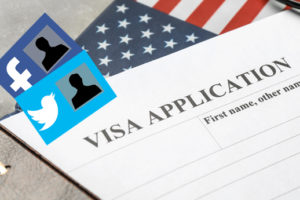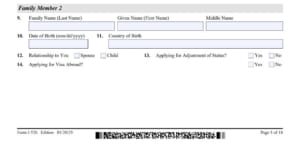U.S. visa applicants will now be required to provide their social media identities on social media platforms during the five years preceding the date of application – with an option to voluntarily list other handles not explicitly required.
 The new requirement follows the Trump administration’s promise of “extreme vetting” of foreigners entering the U.S. for national security.
The new requirement follows the Trump administration’s promise of “extreme vetting” of foreigners entering the U.S. for national security.
This is an extension of the previous administration’s instructions to collect social media identifiers when the State Department determines “that such information is required to confirm identity or conduct more rigorous national security vetting.”
Greater attention was placed on immigrants’ social media use after it was revealed that one of the attackers of the 2015 San Bernardino terrorist attack had, under a pseudonym, advocated Jihad in posts on a private social media account. Authorities did not find the account until after she was allowed entry into the United States and had carried on the attack.
Approximately 15 million people will be affected annually, including applicants for permanent residency.
Some expressed their concerns on the proposal’s effects on freedom of speech and association and on privacy.
On a more practical note, critics also complain that the proposal could make it harder to legally immigrate to the U.S. as the proposal could make the process slower.
In addition to social media handles, U.S. visa applicants are also required to submit five years of previously used telephone numbers, email addresses, and international travel, and whether specified family members have been involved in terrorist activities, regardless of visa application type. For applicants for Immigrant Visas, applicants will be required to disclose all prior immigration violations, while applicants for Nonimmigrant Visas will be asked whether they have been deported or removed from any country, not just the United States.
The State Department intends not to routinely ask the question of applicants for most diplomatic and official visa applicants.




